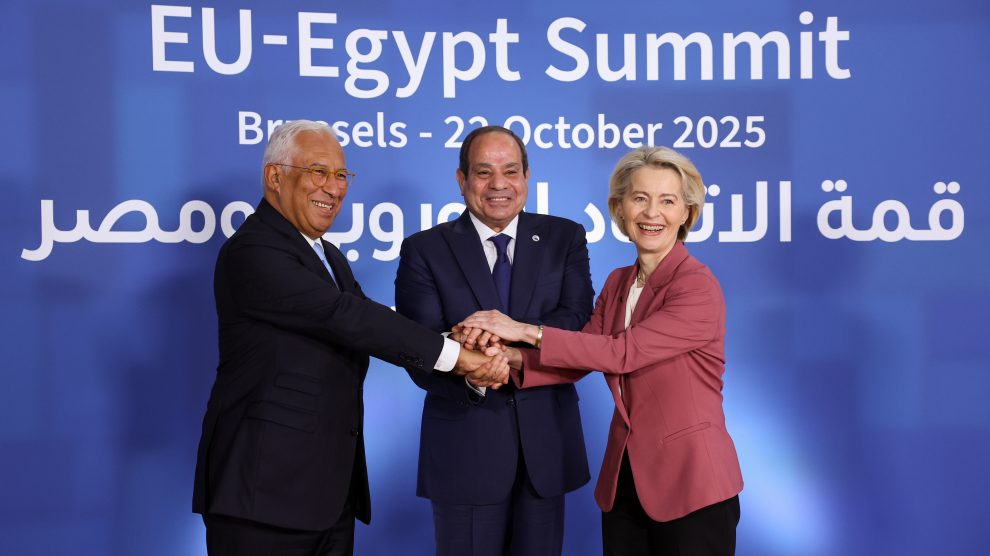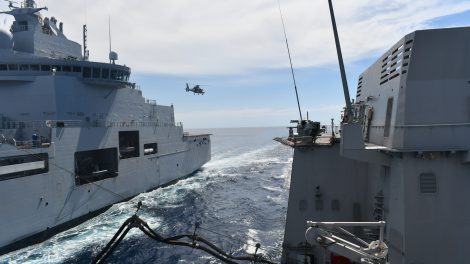The news: On November 1, Italian Prime Minister Giorgia Meloni will be in Egypt to inaugurate the Grand Egyptian Museum in Giza, becoming the first European leader to visit Cairo after the summit that reshaped Brussels’ relationship with al-Sisi’s government.
Why it matters: The EU sees Egypt as a pillar of stability in the MENA region and a crucial interlocutor on crises ranging from the Gaza war to migration.
- An EU source described al-Sisi’s visit as “the formal launch of a structured, financially solid and politically significant partnership, confirming Egypt as the most stable partner on the southern shore of the Mediterranean.”
- Behind the “strategic partnership” lies a clear political choice: prioritising stability and economic cooperation over strict human-rights conditionality.
By the numbers:
- €7.4 billion: total value of the partnership signed in 2024 — the EU’s largest ever with a third country.
- €4 billion: second tranche of macro-financial assistance approved in Brussels.
- €75 million in grants to support social projects in health, education, and the inclusion of women and youth.
- €200 million: for migration management, including border control and legal pathways.
- €110 million: for sustainable development and skills.
- + Egypt’s association with Horizon Europe, the EU’s flagship research and innovation program.
What they said
- “Our partnership is stronger than ever,” said Ursula von der Leyen.
- “An opportunity to advance stability, peace and shared prosperity,” added António Costa.
- In their Joint Statement, the parties pledged to “deepen long-term strategic ties and cooperate on common global and regional challenges.”
Context: For Brussels, “Egypt is a key partner in promoting stability through peace initiatives and conflict-resolution efforts in the Middle East,” according to the European Council’s summary note.
- Costa praised al-Sisi’s “tireless mediation efforts toward a ceasefire in Gaza” and reaffirmed the EU’s readiness to support “recovery and reconstruction.”
- Behind the agreement lies a geopolitical logic as well: it encompasses the influence of China, Russia, and the Gulf in North Africa, while securing the EU’s foothold in energy and migration matters.
Between the lines: Not everyone in Europe agrees. Parts of the European Parliament have criticised the absence of democratic conditionality.
- A senior EU diplomat told Decode39 the Commission is “moving toward a more holistic, less conditional — but likely more effective — approach in the long run.”
Rome and Cairo: a connectivity platform. A recent report by the Mediterranean Platform of the Luiss School of Government identifies Italy and Egypt as “geographically and politically best positioned to lead the Mediterranean connectivity agenda.”
- Rome: the EU’s northern anchor for energy, data, and goods flows.
- Cairo: a regional hub leveraging the Suez Canal, Special Economic Zones, and the Zohr gas field.
- The report urges transforming this complementarity into a Rome–Cairo axis to align standards, mobilise financing instruments, and develop joint projects in energy, digital, and maritime infrastructure.
- Key recommendations include:
- creating a Mediterranean Connectivity Facility to coordinate EU and Global Gateway funds;
- promoting joint ventures between Italian shipyards and Egyptian ports;
- strengthening energy and digital corridors;
- enhancing regulatory convergence and trust-building.
The Italian signal. Meloni’s upcoming presence at the Grand Egyptian Museum is more than symbolic.
- It’s a statement of strategic projection — an effort to reaffirm the Mediterranean’s centrality in European policy and to link the EU–Egypt partnership with Italy’s Mattei Plan for Africa, focused on equitable and infrastructure-based cooperation along the southern shore.
What we’re watching: The EU–Egypt axis, with Italy as a hinge, could evolve into a pillar of the future Euro-Mediterranean architecture, shaping the region’s approach to energy, security, and migration.
- If current promises translate into tangible projects and shared rules, the Brussels summit could mark the beginning of a new phase of Mediterranean integration.





